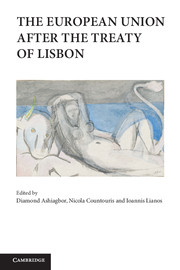Book contents
- Frontmatter
- Contents
- The European Union after the Treaty of Lisbon
- Introduction
- 1 The institutional development of the EU post-Lisbon
- 2 Competence after Lisbon
- 3 The Charter, the ECJ and national courts
- 4 Accession of the EU to the ECHR
- 5 EU citizenship after Lisbon
- 6 The law and politics of migration and asylum: The Lisbon Treaty and the EU
- 7 The European Union's common foreign and security policy after Lisbon
- 8 The European Ombudsman and good administration post-Lisbon
- 9 European contract law after Lisbon
- 10 Competition law in the European Union after the Treaty of Lisbon
- 11 The unexpected revision of the Lisbon Treaty and the establishment of a European stability mechanism
- Index
- References
7 - The European Union's common foreign and security policy after Lisbon
Published online by Cambridge University Press: 05 June 2012
- Frontmatter
- Contents
- The European Union after the Treaty of Lisbon
- Introduction
- 1 The institutional development of the EU post-Lisbon
- 2 Competence after Lisbon
- 3 The Charter, the ECJ and national courts
- 4 Accession of the EU to the ECHR
- 5 EU citizenship after Lisbon
- 6 The law and politics of migration and asylum: The Lisbon Treaty and the EU
- 7 The European Union's common foreign and security policy after Lisbon
- 8 The European Ombudsman and good administration post-Lisbon
- 9 European contract law after Lisbon
- 10 Competition law in the European Union after the Treaty of Lisbon
- 11 The unexpected revision of the Lisbon Treaty and the establishment of a European stability mechanism
- Index
- References
Summary
Introduction
The European Union has been going through a long group therapy process since the end of 2001. This culminated in a treaty which died a long and slow death following two referenda (the Treaty Establishing a Constitution for Europe), another treaty (the Lisbon Treaty), and two further referenda in Ireland before the new constitutional arrangements entered into force in December 2009.
Throughout these eight years of self-reflection, the foreign affairs of the Union were at the centre of interest and debates. This was made clear in the Laeken Declaration, which kick-started the process in 2001, and raised this question: ‘Does Europe not, now that it is finally unified, have a leading role to play in a new world order, that of a stabilising role worldwide and to point the way ahead for many countries and peoples?’ Once the Constitutional Treaty was signed, the then President of the Commission, Romano Prodi, stated that ‘today, Europe is reaffirming the unique nature of its political organization in order to respond to the challenges of globalisation, and to promote its values and play its rightful role on the international scene’.
- Type
- Chapter
- Information
- The European Union after the Treaty of Lisbon , pp. 185 - 209Publisher: Cambridge University PressPrint publication year: 2012
References
- 1
- Cited by



